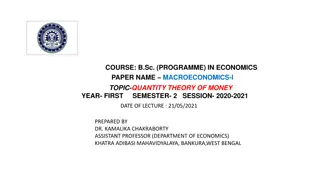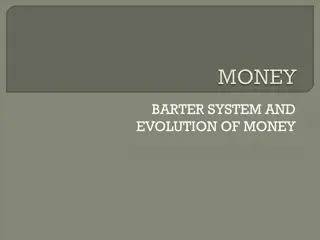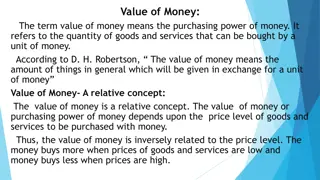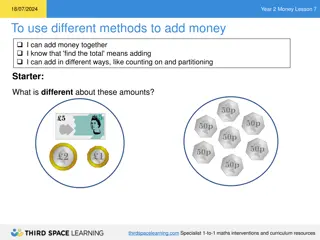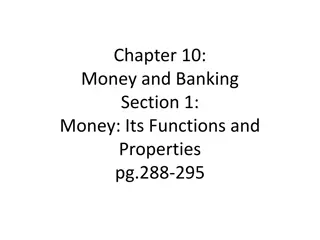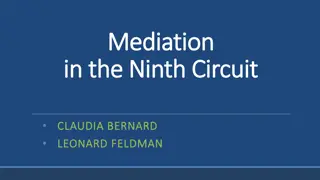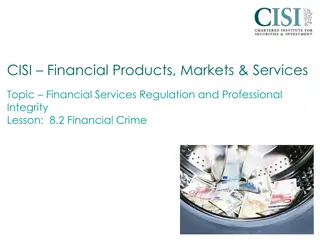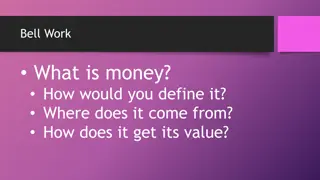
Money Management Strategies to Avoid Common Financial Mistakes
Learn how to avoid money mistakes by creating a financial plan for the future, setting short-term, intermediate, and long-term goals, and living within your means through effective cost-cutting strategies. Take action now to secure your financial future!
Uploaded on | 2 Views
Download Presentation

Please find below an Image/Link to download the presentation.
The content on the website is provided AS IS for your information and personal use only. It may not be sold, licensed, or shared on other websites without obtaining consent from the author. If you encounter any issues during the download, it is possible that the publisher has removed the file from their server.
You are allowed to download the files provided on this website for personal or commercial use, subject to the condition that they are used lawfully. All files are the property of their respective owners.
The content on the website is provided AS IS for your information and personal use only. It may not be sold, licensed, or shared on other websites without obtaining consent from the author.
E N D
Presentation Transcript
TOP 5 MONEY MISTAKES Learn strategies to help you avoid these money snafus.
That money talks, Ill not deny, I heard it once: it said, good-bye . ~Richard Armour
Mistake #1: HAVING NO FINANCIAL PLAN FOR THE FUTURE
TAKE THESE ACTIONS TO AVOID MISTAKE #1: Identify financial areas you need to research. Set specific financial goals for the future. Begin putting money aside to reach your goals. Maintain your motivation. Get out of debt.
THAT WHICH YOU FOCUS ON WILL GROW! SET SHORT-TERM, INTERMEDIATE, AND LONG-TERM GOALS.
SHORT-TERM GOALS For the next 3 years: Purchase a car and obtain all the types of insurance you need (health, home, car, life). Pay off school loans, pay down debts, and pay bills on time. Create an emergency fund and plans for savings, investments, and retirement savings.
INTERMEDIATE GOALS You might plan to address these goals in 3-10 years: Set aside money if you plan to get an advanced degree. Plan for wedding expenses and a down payment on a home. Prepare for expenses associated with birth or adoption of a child. Assign someone as your power of attorney and draw up a will. Increase amount of money you re saving and investing, if possible.
LONG-TERM GOALS Include your financial outlook from 10 years out to your retirement. Possible options include: Continue paying into retirement accounts. Make housing and other retirement arrangements. Start a fund, like a 529 plan, to provide for your kids education. Plan to support aging parents, including long-term health care for them, yourself, and your spouse. Meet with your financial advisor to discuss finances 3 to 6 months before you retire.
Mistake #2: LIVING OUTSIDE YOUR MEANS
USE THESE STRATEGIES TO CUT COSTS AND LIVE WITHIN YOUR MEANS: Refinance mortgage or auto loan. Look each month for household costs to cut. Reduce credit card debt. Budget entertainment spending. Watch your food expenses.
3 TIPS TO SAVE AND REMAIN WITHIN YOUR BUDGET: Save a bit of money each day. Set aside $10 daily for retirement. Track spending on Mint.com and set budgeting goals.
Mistake #3: NOT HAVING AN EMERGENCY FUND
Life is full of unexpected surprises. Consider these points when starting an emergency fund: It will take some time, but just keep saving. Put back 3 to 6 months living expenses. Remember that you re saving for rent, car payments, utilities, house bills, insurance, groceries, & credit card bills. If you save $200-$300 dollars monthly, in 1 year, you ll have a good start on the fund.
BUILD YOUR EMERGENCY FUND: Set a date you ll start saving. Start small. Check out existing accounts & policies. Contribute previously wasted money. Save tax refunds and bonus checks. Use your dividend earnings.
Mistake #4: WAITING TOO LONG TO SAVE FOR RETIREMENT
FOLLOW THESE 5 STEPS TO YOUR FUTURE RETIREMENT: Learn about savings plans at your employer. Explore other investment oppor- tunities. Find out about social security benefits. Plan now for retirement savings. Start saving in an IRA now.
Mistake #5: NOT ENOUGH INSURANCE
CRITICAL TYPES OF INSURANCE: Health insurance Homeowners insurance A leading reason for declaring bankruptcy is the lack of health insurance. It s usually a requirement of your mortgage lender. Obtain coverage for the cost of the structure, your belongings inside, & cost of living elsewhere during repairs. Check with your employer or seek insurance yourself. For lower premiums, choose plans with higher deductibles and co-pays. Get liability coverage in case someone is injured on your property.
CRITICAL TYPES OF INSURANCE Autoinsurance Life insurance If you re one of the main breadwinners, you should definitely have it for your family s security. If you have an accident without insurance, you could be sued. At the least, get liability coverage for individual and bodily injury and property damage. To figure coverage amounts, multiply your yearly wage by the # of years you plan to work.
HOW TO COMPARE INSURANCE QUOTES: Some insurance websites offer comparison shopping where you can enter your personal info to see costs of different insurance policies. Some quotes are given immediately on the phone while others will require a few days to figure. Call insurance companies, speak to an agent, and request quotes on all the insurances you re interested in.
OTHER TYPES OF INSURANCE YOU MIGHT CONSIDER: Business insurance to cover your liability in the event of an unforeseen work crisis. Disability insurance that will pay you if you re injured and can no longer work. Life insurance for your children to cover funeral and burial-related costs. Accidental death insurance in the event you die unexpectedly.
I dont want to tell you how much insurance I carry with the Prudential, but all I can say is: when I go, they go, too. ~Jack Benny
CONCLUSION Money can t buy happiness but can buy life s necessities. Live within your means. Financial mistakes can hold you back from the life you deserve. If you lack a financial plan, make one today. Plan for the unexpected by setting up an emergency fund. Purchase sufficient insurance coverage. Start saving for retirement now.
Money isnt everything but it ranks right up there with oxygen. ~Rita Davenport









